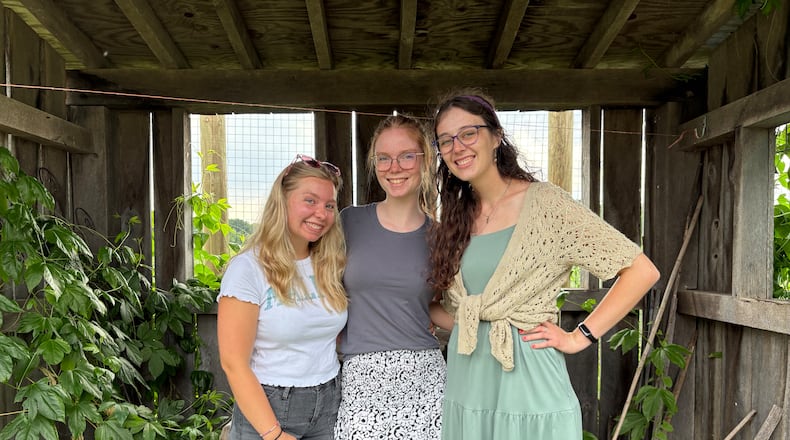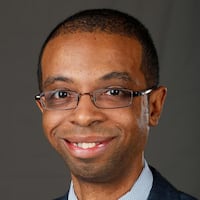“Five Rivers MetroParks has great relationships with local universities and looks to collaborate whenever we can with students and faculty,” said Lauren Lemons, marketing and public engagement specialist for Five Rivers MetroParks. “For example, it’s not unusual to find UD professors and their students conducting research in our parks or giving a presentation to the public on their findings at Cox Arboretum MetroPark. Our education staff encourage teachers to use nature as a classroom at an early age and that doesn’t stop after high school.”
Credit: Russell Florence Jr.
Credit: Russell Florence Jr.
UD rising juniors Shannon Dennemann, Grace Haas and Hannah Scheuller are interning with MetroParks this summer to assist in the organization’s ongoing sustainability efforts. As part of HSI, the trio is committed to ensuring UD is a more sustainable campus and community and taking a leadership role in sustainability education and research.
“MetroParks is hosting HSI interns as part of a summer internship program, which runs through the beginning of August,” Lemons said. “Because MetroParks is a conservation agency and is dedicated to being a climate leader in the region, working with the Hanley Sustainability Institute program at UD is a great fit. We are able to provide hands-on learning opportunities for students and they provide us with helping hands and their expertise as young students who have a vested interest in the environment and its future.”
Reducing food waste
On a recent visit to Possum Creek MetroPark, sharing the importance of reducing food waste was a top priority.
“Approximately one-third of food is sent to landfills each year but it can be prevented,” Scheuller said. “It’s important to keep food out of landfills because it produces potent greenhouse gas. By keeping food out of landfills it can be composted and that material can be reused, sent back to the earth, and repurposed in a more eco-friendly way.”
“Save your food scraps and compostable items, such as napkins, plates or other small materials, and take them to various locations who do composting such as 2nd Street Market,” Haas said. “It will really help reduce the waste that’s in the landfill.”
Dennemann recommended the art of vermiculture, which incorporates composting with worms.
“You put worms in a bin, however small or large, and you fill the bin with your scraps for the worms to eat and make dirt,” she said. “It’s really easy because it’s indoors and worms like the same climate we do.”
Credit: Russell Florence
Credit: Russell Florence
Lemons said composting also saves money on good soil, particularly for the Possum Creek demonstration garden, an organic collection of flowers and vegetables.
“All of the stuff that’s composted here is used to feed this garden and it’s booming, which is good,” Lemons said. “We have this garden as an example of what can be grown if you take an organic approach to gardening. We don’t use herbicides or pesticides. And when you grow your own things, it’s often healthier and more sustainable. When you go into your backyard (for food), you don’t have to go out and drive so there’s less miles on the road. We always encourage people to shop local too.”
As more gatherings occur this summer, Haas pinpointed the need to adopt a reusable mindset.
“Go for material that’s already reusable like plates or utensils you already have in your kitchen,” she said. “But if you do need to use plastic items, try washing them and saving them again for your next gathering or purchase compostable material.”
‘Sustainability connects to so many different things’
Reflecting on her passion for sustainability, Dennemann acknowledges the combination of environmental and social.
“I grew up (loving) parks and the earth, and (over time) I learned more about what was happening and the Earth was in danger,” she said. “I want future generations to be able to see what I saw. I also love interacting with people so there is a social component to sustainability.”
She also works with the city of Dayton’s Office of Sustainability and has been encouraged by the results.
“Dayton is really doing a lot of work to better itself and be more intentional about sustainability,” Dennemann said. “There is a lot of support for our work because people see what we are doing is benefitting others.”
Scheuller, who grew up in West Carrollton, was motivated by sustainability issues in middle school and has grown more cognizant of related topics such as environmental injustice.
“People are not given proper access to resources or access to natural places or even food in some cases,” she said. “Sustainability connects to so many different things. I think the way we go forward into the future is best done in a way that can be sustained for both the earth and people.”
Credit: Russell Florence
Credit: Russell Florence
Haas enjoys the interdisciplinary aspect of being a sustainability major.
“Being a sustainability major feels like a new thing that’s up and coming but sustainability has so many different avenues and affects everyone,” she said. “Sometimes making progress with sustainability issues can be an uphill battle but MetroParks has so many people that care about what they do and making change and connections. Interning with MetroParks has been such a cool experience.”
Lemons said she is “heartened” by young people being concerned about the world at such a pivotal time.
“I think young people know the climate is changing — they are experiencing it in real time — but sometimes it can seem like protecting the environment is such a big challenge, one might not know where to start,” she said. “These students will be able to answer that big question: How can we start to make a positive impact the environment today, whether it’s a workplace, municipality or home?
She also hopes MetroParks continues to bring young people into the fold as environmental and sustainability stewards.
“Fostering an appreciation of nature now among young folks ensures that our environment will be appreciated and protected in the future.”
Credit: Russell Florence
Credit: Russell Florence
About the Author






